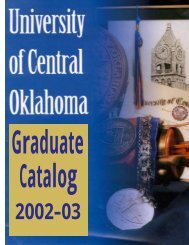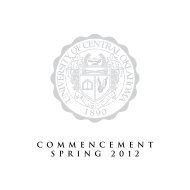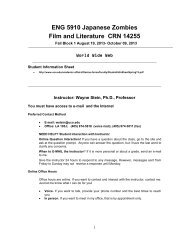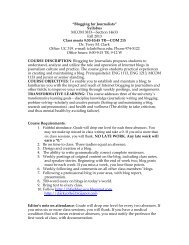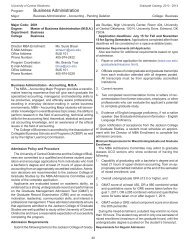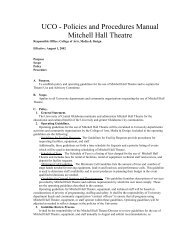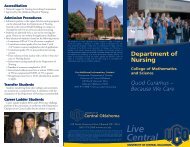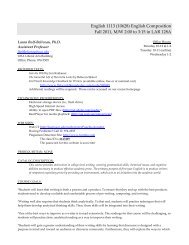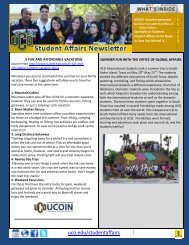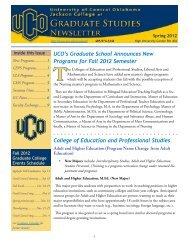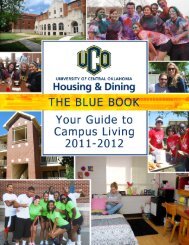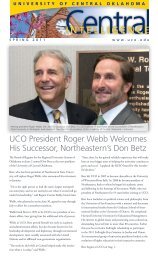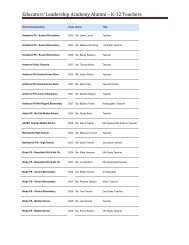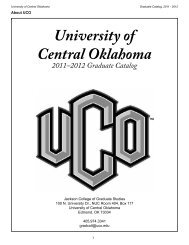Graduate Catalog - University of Central Oklahoma
Graduate Catalog - University of Central Oklahoma
Graduate Catalog - University of Central Oklahoma
You also want an ePaper? Increase the reach of your titles
YUMPU automatically turns print PDFs into web optimized ePapers that Google loves.
<strong>University</strong> <strong>of</strong> <strong>Central</strong> <strong>Oklahoma</strong><br />
<strong>Graduate</strong> <strong>Catalog</strong>, 2012 - 2013<br />
<strong>Graduate</strong> Course Descriptions<br />
CJ 5900 - Practicum In Criminal Justice<br />
Credit will vary from 1 to 4 hours. Subject matter will vary within the<br />
department’s field <strong>of</strong> study. Supervised practical application <strong>of</strong> previously<br />
studied theory. Limited to four semester hours per enrollment.<br />
CJ 5910 - Seminar / Special Topics<br />
Credit will vary from 1 to 4 hours. Subject matter will vary within the<br />
department’s field <strong>of</strong> study.<br />
CJ 5920 - Workshop<br />
Credit will vary from 1 to 4 hours. Subject matter will vary within the<br />
department’s field <strong>of</strong> study. Normally involves lecture, films, guest<br />
speaker, etc. A grade <strong>of</strong> “P” or “F” is given.<br />
CJ 5930 - Individual Study<br />
Credit will vary from 1 to 4 hours. Subject matter will vary within the<br />
department’s field <strong>of</strong> study. Study completed on an individual basis<br />
covering material specified by the instructor.<br />
CJ 5940 - Field Study<br />
Credit will vary from 1 to 9 hours. Subject matter will vary within the<br />
department’s field <strong>of</strong> study.<br />
CJ 5950 - Internship In Criminal Justice<br />
Credit will vary from 1 to 8 hours. Subject matter will vary within the<br />
department’s field <strong>of</strong> study. Supervised practical experience gained<br />
in a pr<strong>of</strong>essional field by an advanced or graduate student.<br />
CJ 5960 - Institute In Criminal Justice<br />
Credit will vary from 1 to 8 hours. Subject matter will vary within the<br />
department’s field <strong>of</strong> study. Assignments are given and students<br />
receive normal letter grades.<br />
CJ 5970 - Study Tour In Criminal Justice<br />
Credit will vary. Subject matter will vary within the department’s field<br />
<strong>of</strong> study. An enrollment associated with educational travel organized<br />
through university faculty. Such enrollment may be for credit or audit.<br />
CJ 5990 - Thesis In Criminal Justice<br />
Credit will vary from 1 to 6 hours. Subject matter will vary within the<br />
department’s field <strong>of</strong> study.<br />
COMPUTER SCIENCE (CMSC)<br />
Department <strong>of</strong> Computer Science<br />
CMSC 5023 - Programming Languages<br />
This course provides a study <strong>of</strong> the underlying concepts <strong>of</strong> programming<br />
languages such as automata, grammars, translation, bindings,<br />
scope, data types, control, subprogramming, concurrency, and<br />
exception handling. Languages representing contrasting paradigms<br />
are studied. Prerequisite(s): CMSC 3613; admission to the graduate<br />
program.<br />
CMSC 5033 - Concepts Of Artificial Intelligence<br />
This course covers the basic concepts and techniques <strong>of</strong> artificial<br />
intelligence or intelligent systems. It includes an introduction to some<br />
<strong>of</strong> the s<strong>of</strong>tware packages that are used to develop expert systems.<br />
Other issues <strong>of</strong> importance in this course are natural language, pattern<br />
recognition, search strategies, knowledge representation and<br />
logical inference. Prerequisite(s): CMSC 3613.<br />
CMSC 5043 - Applications Of Database Management<br />
This course covers the integration <strong>of</strong> theory and practice in the use<br />
<strong>of</strong> current database systems and the access <strong>of</strong> those systems. The<br />
course covers the relational land E-R models for database organization.<br />
Topics included in the course are query languages (e.g. SQL),<br />
database integrity and security, file access methods, query processing,<br />
transaction processing, and backup/recovery. Prerequisite(s): CMSC<br />
2613 and MATH 2313 and (STAT 3103 or 4113) and graduate standing.<br />
CMSC 5053 - Operating Systems<br />
This course is a study <strong>of</strong> operating system concepts including<br />
concurrent processes, mutual exclusion techniques, deadlock, real<br />
and virtual memory management, job scheduling, auxiliary storage<br />
management, network operating systems and multiprocessing.<br />
Prerequisite(s): CMSC 3613.<br />
CMSC 5063 - Networks<br />
This course is a study <strong>of</strong> local and wide area networks and their<br />
implementations. Included is the theory governing layered networking<br />
architectures, the ISO-OSI communications interface, the<br />
TCP/IP protocol, packet transmission, error-correction techniques,<br />
addressing and routing, and the use <strong>of</strong> communications s<strong>of</strong>tware.<br />
Prerequisite(s): CMSC 3613.<br />
CMSC 5073 - Translator Design<br />
Translator Design introduces students to the principles, tools and<br />
techniques used in designing a programming language compiler.<br />
Topics covered include lexical, syntax, and semantic analysis, finite<br />
automata, regualar expressions, LL and LR grammars, type systems<br />
and checkers, code generation, interpreters, optimization, and code<br />
improvement. Prerequisite(s): CMSC 3613 and graduate standing.<br />
CMSC 5113 - Structured Design<br />
This course covers the elements <strong>of</strong> a discipline <strong>of</strong> program and systems<br />
design. Emphasis will be placed on the architecture <strong>of</strong> programs<br />
and systems rather than programming. Prerequisite(s): CMSC 3613.<br />
CMSC 5123 - Advanced Microcomputer Applications<br />
This course is a survey <strong>of</strong> the installation and programming <strong>of</strong> microcomputers<br />
using microcomputer based operating systems with<br />
emphasis on maintaining tree structured directories, programming<br />
batch files, controlling i/o redirection, working with serial and parallel<br />
ports, using internal operating system commands and utilities, and<br />
installing vendor provided s<strong>of</strong>tware.<br />
CMSC 5133 - Theory Of Data Base Systems<br />
This course covers the concepts, principles, implementation practices,<br />
and guidelines for the selection and installation <strong>of</strong> data base<br />
systems. Topics include choosing a dictionary, the relational approach,<br />
the hierarchical approach, and the network approach. There will be<br />
some discussion <strong>of</strong> security and integrity comparison. Prerequisite(s):<br />
CMSC 4003 or CMSC 5043.<br />
CMSC 5243 - Artificial Intelligence<br />
This course is a study <strong>of</strong> the basic concepts and techniques <strong>of</strong> artificial<br />
intelligence or intelligent systems. Some <strong>of</strong> the topics covered<br />
are search techniques, heuristics, expert systems, systems <strong>of</strong> logical<br />
inference, methods <strong>of</strong> representing knowledge, and AI programming.<br />
Prerequisite(s): CMSC 4133 or 5033.<br />
CMSC 5273 - Theory <strong>of</strong> Computing<br />
Theory <strong>of</strong> Computing is a study <strong>of</strong> computation theory encompassing<br />
three broad categories: formal languages and automata theory,<br />
computability theory, and complexity theory. The topics covered<br />
include Turing machines, finite automata, nondeterminism, pushdown<br />
automata, decidability, and NP- completeness. Prerequisite(s): CMSC<br />
3613 with a minimum grade <strong>of</strong> “C”.<br />
CMSC 5283 - S<strong>of</strong>tware Engineering<br />
S<strong>of</strong>tware Engineering is the application <strong>of</strong> engineering and management<br />
disciplines to computer s<strong>of</strong>tware projects. Topics discussed are<br />
the s<strong>of</strong>tware life cycle, CASE tools, requirement engineering, s<strong>of</strong>tware<br />
models and architectures, s<strong>of</strong>tware design and development, testing<br />
and validation, maintenance and evolution, project organization,<br />
management and cost estimation, and s<strong>of</strong>tware quality assurance<br />
and risk analysis. Prerequisite(s): CMSC 2613 and MATH 2313 and<br />
(STAT 3103 or 4113).<br />
204



